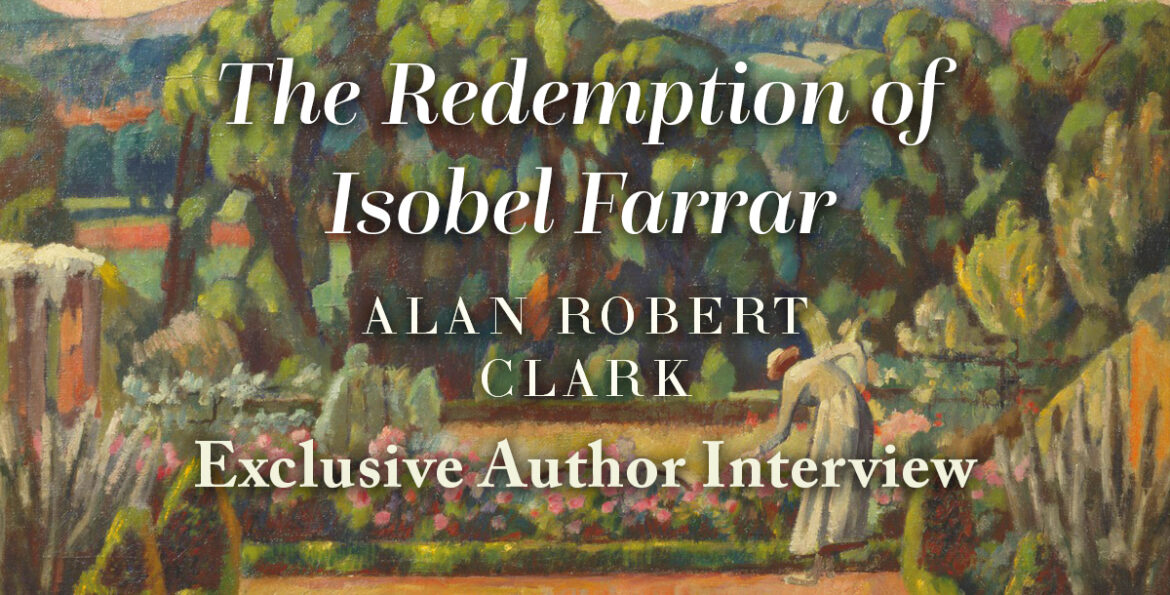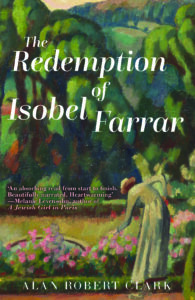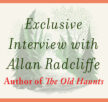

Alan Robert Clark: Interview for The Redemption of Isobel Farrar
- 30th May 2023
- Category : Author,Interviews & Blogs
Alan Robert Clark is the author of the historical novel The Redemption of Isobel Farrar. An author and ghost-writer from Scotland, this is his third novel with Fairlight Books. The Redemption of Isobel Farrar takes place in 1926 England and follows the WWI veteran Frank Brody and ageing widow Lady Isobel Farrar. When mother and son are finally reunited, will they be able to lay the past to rest?
Familial relationships are particularly important in this novel. Was there any specific inspiration behind this theme?
Yes, my own mother struggled hard to deal with my sexuality and, despite genuine effort, never quite won the battle. Spoiler Alert – the novel, set sixty years before my personal experience and in far less tolerant times, Isobel faces the same challenge.
What in Redemption did you find most difficult to write?
Probably the childhood loneliness and trauma of my hero Frank Brodie. I could relate to that personally to a certain extent, although I never suffered his physical abuse or material deprivation. Loneliness is maybe the saddest thing we can suffer in this world. And the last couple of pages were hard too, the saying goodbye to the characters though, strangely enough, those pages flew off the pen.
What was your inspiration behind this novel?
I’m not normally a big fan of reality TV, but it was partly ITV’s ‘Long Lost Family’ to which I became mildly addicted for a while, although it was formulaic, repetitive and brazenly manipulative of the audience’s tear-ducts. Yet many of the stories were so powerful that all of that somehow didn’t matter. The emotions of those involved were always the same: the wrenching, lifelong sense of loss felt by the birth parent and the resentment still felt by the child, even decades later, and its visceral need to know why it had been ‘rejected’.
I also recalled the whispered gossip about a spinster great-aunt in my own family, who was said to have given birth to the baby out of wedlock, which was given up for adoption in the early 20th century. I vaguely remembered this old lady from my childhood; a melancholy wisp of a thing who rarely smiled. I then talked to a few women who had ‘lost’ a child in one way or another and became interested in writing a story about characters who go through this awful experience and decided to set it in the past, when that experience was possibly even more traumatic for a woman.
What was it like transitioning into a new historical setting from your last novel?
My last novel Valhalla and the penultimate one The Prince Of Mirrors were both set in the 1880s/90s. That same period recurs in the flashback scenes of The Redemption of Isobel Farrar so that was obviously fine, but the bulk of the new novel takes place in the late 1920s, just 40 years later. So, it wasn’t exactly a vast leap in time. Probably the most important thing to understand was what a huge watershed World War One had been in so many ways – a whole generation of young men wiped out, the guilt of the survivors, the old order badly fractured even if not entirely shattered, the feeling that, for better or worse, nothing would ever be quite the same again
If you could describe The Redemption Of Isobel Farrar in one word what would it be?
Four words please. The need for forgiveness.

Do you have a method of portraying LGBT characters in time periods that weren’t accepting of their identities?
I’d not call it a method exactly. As in The Prince Of Mirrors which, like my new novel, also had a strong LGBT dimension, I simply read as much as possible about the lives led by gay people in the late 19th and early 20th centuries. It is pretty well-annotated. It was after all the era of Oscar Wilde, Edward Carpenter and other gay icons whose influence is still felt today. Perhaps the major difference between then and now was that, outside intellectual Oxbridge circles, there was an almost universal lack of understanding that there could be loving, long-term relationships between men. Homosexuality was viewed by most people as little else than a particularly repellent manifestation of generalised male lust.
What do you want readers to learn from Isobel and Frank Brodie?
It’s never too late to try to fix what has gone wrong in the past – even if you don’t succeed or succeed only partly. It’s the willingness to try that matters. That’s the way to redemption.
Do you research the historical setting before or while writing?
I do a lot of reading before writing, up until the point that my brain is bursting with it and I’ve reached the point where I feel I can almost ‘smell’ the era. That’s when I start to write. If I become aware of any further gaps in my knowledge as the story unfolds, I’ll plug them, but will do that as quickly as I possibly can. Research can be a very tempting digression from the essential business of writing that scary first draft, which always demands a degree of momentum and too much digression impedes that.
Was there a historical figure who influenced any of the characters in Redemption?
No, but some of the characters were inspired by people in my life today. In my mind’s eye, I costume them in the clothes of the period, hijack the bits of their personalities and stories that I think I need and see if the transposition rings true. If it does, I use it.
If you could say one thing to Isobel Farrar and Frank Brodie, what would it be?
I love you, and now I’ve finished writing about you, I miss you. But that’s always the way of it and should be. If you don’t miss the people you’ve created, you’ve probably not done a great job in creating them.
The Redemption of Isobel Farrar is out June 1. Order now from Blackwell’s and Waterstones.
To find out more about Alan visit his author page or his website.














